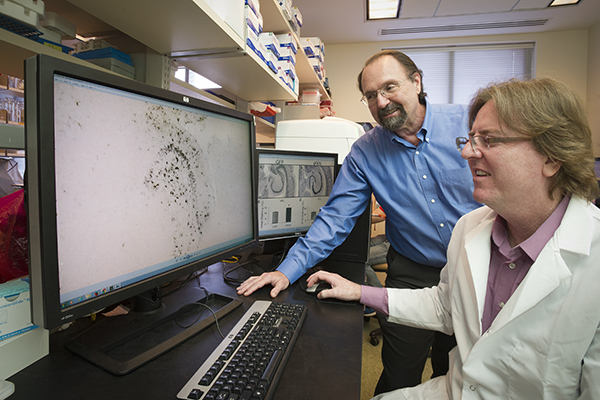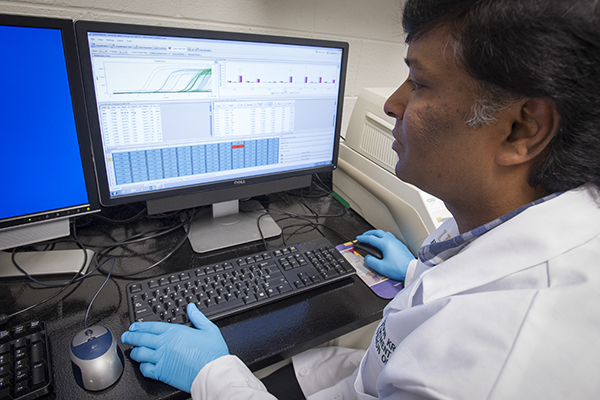
Dressed in business attire, middle school students from two local same-gender magnet schools listened intently as USF Health staff described the paths they have taken – some direct, some not-so-direct – to get to their current jobs.
Health care providers, administrators and students visited the Boys Preparatory Academy Franklin Middle School on Jan. 27 and the Girls Preparatory Academy Ferrell Middle School Feb. 10, and were joined by other speakers from the community, including a professional wrestler and football player, a meteorologist, and Tampa Fire Rescue teams.

USF Physicians Group CEO Rich Sobieray talked with middle school Students at Boys Preparatory Academy Franklin Middle School Jan. 27.
The annual Career Days, which is coordinated by USF Health, was spearheaded by Catherine Lynch, MD, professor and associate vice president for Women’s Health and Faculty Development for USF Health and associate dean for faculty development for the USF Health Morsani College of Medicine.
Now in its fourth year, the two days offer budding professionals and young entrepreneurs insight and advice from experts in a range of fields, and the impact is felt by speakers, as well as students, Dr. Lynch said.
“The Career days at Franklin and Ferrell Magnet schools have been very rewarding for all who participate,” she said. “We have tried to provide a wide variety of career options for the students to hear about and often the presenters have great personal stories of their path to their careers. The students seem to really enjoy the opportunity to interact and hear about different interesting careers.”
About 50 USF Health faculty, staff and students talked with the middle schoolers. Without fail, the presenters leave the schools with smiles on their faces and hopefully a positive sense about their career and their day, Dr. Lynch said.
“As I was being escorted by one of the 8th graders at Franklin, he told me that he was excited to meet all the USF people as this is where he thinks he will go to college and thinks he wants to be a physician’s assistant after hearing a presenter talk about that career.”

USF Health Chief Communications Officer John Robinson shares his previous career experiences managing communications for Central Command at MacDill Air Force Base.
Sharing their successes and challenges of their own career paths were:
Presenting at the Franklin Middle Magnet School Jan. 27:
Thaddeus Bullard (Titus O’Neil), Professional Wrestler/Football Player
William Carpenter, Instructional Designer – USFSP Alumni
Mike Clay, (SKYPE) Chief Meteorologist – Bay News 9
Edwing Daniel, Director/MD Admissions, USF Health MCOM
Stanley Douglas, Assistant VP Operations and Facilities Management USF Health
Shane Earley, Athletic Trainer – SMART
Daniel Gomez, Assistant Prof/OB-GYN, USF Health MCOM
Brian Graves, Assistant Professor/USF College of Nursing
Ralph Kirk, Facility Shift Manager/Dept of Juvenile Justice (Retired Airforce)
Richard Arnold, 4th year student, USF College of Pharmacy
Kevin O’Brien, Associate Professor/Internal Med, USF Health MCOM
Yashwant Pathak, Professor and Associate Dean, USF College of Pharmacy
Robert Pelaia, Deputy General Counsel, USF Health
Zachary Pruitt, Assistant Professor/COPH
John Robinson, Chief Communications Officer/USF Health
Ronald Shelton, Information Technology/ Raymond James Financial
Kevin Sneed, Dean, USF College of Pharmacy
Adewale Troutman, Professor Assoc. Dean/Health Equity and Community Engagement, USF COPH
Peter Bath, Vice President for Mission/ FL Hospital
Earl Johnson, and Steve Horton Student/Veteran/Marine USF Veterans Affairs
Chris Daniel, Chief of USF Police
Janus Fraley, LTC Professor/Military Science/Battalion Commander USF Army ROTC
George Kiefer, USF Head Coach- Men’s Soccer Athletics
Brian Siegrist, Assoc. AD Communications/USF Football Athletics
Andrew Goodrich, Senior Assoc. AD External Relations USF Athletics
Ralph Shick, Asst. AD/Compliance USF – Athletics
Scott Glaser, Senior Assoc. AD/Facilities and Event Management USF Athletics
Tim Anderson, Assoc. AD Academics USF – Athletics
Casey Carter, Fire Fighter/Tampa Fire Rescue
Andrew Guggino, Fire Fighter/Tampa Fire Rescue
Pat Forward, Captain/Tampa Fire Rescue
Joseph Bunts, Fire Fighter/Tampa Fire Rescue
Kevin Antunez, Fire Fighter/Tampa Fire Rescue
Austin Bubley, Fire Fighter/Tampa Fire Rescue
Vincent Jackson, Driver Engineer/Tampa Fire Rescue
Andrew Brown, Fire Fighter/Tampa Fire Rescue
Calvin Johnson, Captain – Tampa Police Department
Richard Sobieray, Chief Executive Officer USF Physicians Group
Presenting at the Ferrell Middle Magnet School Feb. 10:
Diane Allen-Gipson, PhD, Asst. Prof./Pharmacy Sciences/USF College of Pharmacy
Beth Baker, Learning and Devt Facilitator/Public Broadcasting/WUSF – Public Media
Christina Baldwin, MD, Resident/Pediatrics/ USF Health MCOM
Marisa Belote, PhD, MBA, RN, Instructor/USF College of Nursing
Alicia Best, PhD, Assistant Professor/USF COPH
Lani Boothman-Carpenter, MA.Ed, Resource Manager IT – USF Health Information Systems
Marie Bourgeois, PhD, MPH, Research Asst. Prof./USF COPH/Environmental and Occup. Health
Jarda Bradford, Police Officer/Tampa Police Department/Special Support Div/Training Unit
Jessica Brumley, PhD, CNM, Dir. Div. of Midwifery/Midwife – OB-GYN/ USF Health MCOM
Jane Castor, Retired Chief of Police: Tampa Police Department
Sheila Connery, MD, Associate Professor/OB-GYN/ USF Health MCOM
Jasmine Cutler, PharmD, USF Women’s Health Fellow, USF College of Pharmacy
Sharon Dabrow, MD, Professor/Pediatrics/ USF Health MCOM
Jasmine Dorsey, Applicantion Developer- USF Health IS
Diane Elmeer, Artist/Tampa Arts Council
Jocelyn Fisher, Senior Associate Athletics Director/USF Athletics
Lisa Gamell, MD, Associate Professor- Ophthalmology/ USF Health MCOM
Michelle Guitard, MS, Doctoral Student/Geological Oceanography/USF College of Marine Science
Marilu Hernandez, Media Sales Manager/Public Broadcasting/WUSF – Public Media
Courtney Justice, Major Assistant Professor Military Science/Army ROTC
Alicia Kaufman, CSTII, Crime Scene Tech II/Tampa Police Forensic Unit
Gretchen Koehler, PhD, AVP for USF Health, Sr Associate Dean, USF Health MCOM
Marci Kornegay, Women’s Golf – Head Coach/USF Athletics
Lindsey Krakower, Coordinator for Community Engagement/USF Athletics
Cindy LaFond, Fire Fighter/Tampa Fire and Rescue
June Lake, MA, Human Resources Director/USF COPH
Taylor Leffler, Graduate Assistant/USF Athletics
Jodie Libadisos, Associate Athletic Director/Student Athlete Enhancement
Juli Marquez, Bay News 9 – Metorologist
Melanie Michael, DNP, Asst. Prof./USF College of Nursing
Jessica Moore, Assistant Athletic Coach – Softball/USF Athletics
Heather Murphy, CNM, Certified Nurse Midwife/OB-GYN, USF Health MCOM
Lyette Pate, MED, MBA, Fiscal Business Specialist, USF Health MCOM
Shalon Pate, BA, Legal Assistant/Christopher Ligori and Associates
Ahn-Kay Pizano, MEd, Assistant Director/MD Admissions/USF Health MCOM
Joann Quinn, PhD, MA, Assistant Professor/Office of Educational Affairs USF Health MCOM
Jodi Ray, MA, Project Director/Lawton & Rhea Chiles Center/USF COPH
Kristin Robinson, PharmD, USF Women’s Health Fellow/USF College of Pharmacy
Dana Rose, Owner/Entrepreneur- Beauty Health Nature
Denise Schilte-Brown, USF Women’s Soccer – Head Coach/USF Athletics
Erini Serag, PharmD, Assistant Professor/Pharmacy Practice/USF College of Pharmacy
Lana Soylu, MD, Assistant Professor/Pediatrics/ USF Health MCOM
Ashley Spies, 4th year Pharmacy Student/USF College of Pharmacy
Joann Strobbe, MS, Chief Financial Officer and Senior AVP Administration/USF Health
Susan Tamme, District Chief/Tampa Fire Rescue
Anna Torrens Armstrong, PhD, MPH, Assistant Professor/Community & Family Health/USF COPH
Barbara Tripp, Captain Quality Improvement Officer/Tampa Fire Rescue
Ambica Tumkur, MD, Assistant Professor/Neurology/USF Health MCOM
Amy Weiss, MD, MPH, Assistant Professor/Pediatrics/Adolescent/USF Health MCOM
Jacqueline Wiltshire, PhD, MPH, Assistant Professor/Health Policy Management/USF COPH
Therese Wooley, Fire Fighter/Tampa Fire and Rescue
Sonya Jacobs, MA, Asst. Dir., USF Health Office of Faculty Development
Catherine Lynch, MD, AVP, USF Health Women’s Health and Faculty Development

From left, Kathleen Wasserman, Lead Teacher at Franklin Middle School, Sonya Jacobs, Assistant Director, USF Health Office of Faculty Development, and Carla Sparks, Supervisor of Single-Gender Programs for Hillsborough County Public Schools.
Photos by Eric Younghans, USF Health Office of Communications
























































![tgh_exterior_day_RSS]](http://hscweb3.hsc.usf.edu/wp-content/uploads/2014/07/tgh_exterior_day_RSS.jpg)

























































